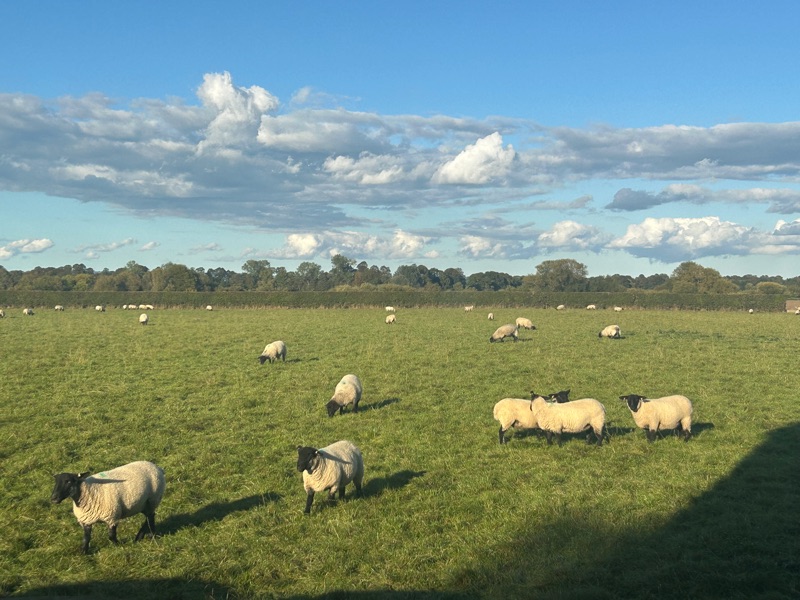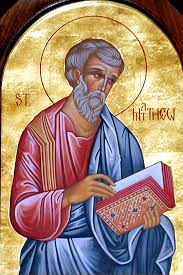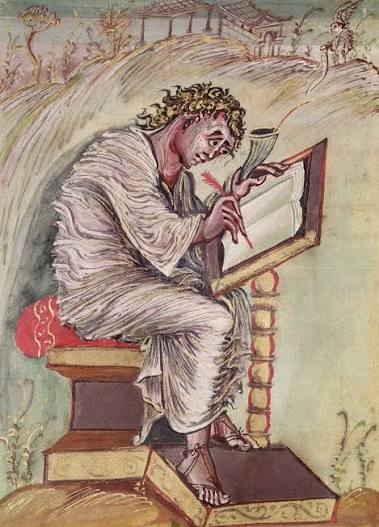Are you good at losing things? What things do you lose and panic until you find them? I’m very good at losing keys, clerical collars, bits of paper I need right now, my car in a multi storey car park but I’m better now because I take a picture of where I park the car and the door of the floor I go out of. I also lose my phone a lot.
We lose our phones at home and we ring the one that’s lost to find it! We had a rental car recently and a woman said as you opened the door after the journey “excuse me, you have left your phone in the car!” She became rather annoying.
Have you ever been so lost on a journey you just go into a tailspin? It usually happens to me when I’m driving in Leeds and in the wrong lane. I love the picture of people lost in the woods, one says help we are lost in the spoom! The other says “you’ve got the map outside down!”
The story of our God is that he keeps trying to find us. Even when we are wayward. In the reading from Exodus today we’ve just heard he considers not helping - the people are stiff necked! But he changes his mind. We know Jesus came to seek and to save the lost.
This Sunday in my service we celebrate that God is love. We are reminded of that in a baptism. Louise and Nathan bring little Aston and to say thank you for him. As we share this sacrament let’s be reminded that our God keeps searching for us until like keys and bits of paper and cars and phones we are found.
Saint Luke has in his fifteenth chapter three stories of things that are lost. The third story of a lost son rather overshadows the other two. A story of a lost coin and a lost sheep.
Jesus is in trouble once again for hanging out with the wrong people. As “all the tax collectors and sinners” come near to listen to him, the Pharisees and scribes begin to grumble: “This fellow welcomes sinners and eats with them.”
In response, Jesus tells the scandalized religious insiders two parables. In the first, a shepherd leaves his flock of ninety-nine to look for a single lamb that is lost. He searches until he finds it, and when he does, he carries that one lamb home on his shoulders, invites his friends and neighbors over, and throws a party to celebrate.
In the second, a woman loses one of her ten silver coins. Immediately, she lights a lamp and sweeps her entire house, looking carefully for the coin until she finds it. Then, like the shepherd, she calls together her friends and neighbours and asks them to celebrate the recovery of the coin: “Rejoice with me, for I have found the coin that I had lost.”
It used to strike me as very unlikely that a woman could expect her friends and neighbours to come to a party in the middle of the night to celebrate the finding of a single coin. There was also a question in my mind about the shepherd who had a hundred sheep and found that he had lost one of them. We are told that he left the ninety-nine in the wilderness to go after the one he had lost. But maybe the stories are about the joy and celebration in the finding again.
Think about it - when you find your keys or your car or your phone or your clerical collar (although I have been known to put a piece of paper in the place it goes at times) there’s a sense of relief and life can go on again. When we find our way back to safety even being vulnerable in our lostness there is joy and relief.
We live at home with indoor rescue cats who don’t do going outside but last week I inadvertently let Toby the tonkinese out the back door while I was getting some washing in. We put it on social media he was missing and notes through our neighbours doors to keep a look out for him. One of our neighbours rang a few days later to say they’d seen a cat in their garden they didn’t recognise. The next night I went with a light on my phone to the ginnel behind our houses and Lis went to the front of the house where he was seen. We both called him and heard a faint miaow. It was a nightmare getting him through the undergrowth and into a cat carrier to get him back indoors to safety. He’s not interested in the back door now!
The lost sheep in the first parable belongs to the shepherd’s flock from the very beginning of the story — it is his sheep. Sheep are stubborn and wayward. I love to watch them as we drive to take the service at Dallowgill. Likewise, the coin in the second parable belongs to the woman before she loses it; the coin is one of her very own.
We get lost over and over again, and God finds us over and over again. Lostness is part and parcel of the life of faith. The great Christian hero Dietrich Bonhoeffer said“God loves the lost.”
But what does it mean to be lost? It means so many things. It means we lose our sense of belonging, we lose our capacity to trust, we lose our felt experience of God’s presence, we lose our will to persevere. We get lost. We get so miserably lost that the shepherd has to wander through the craggy wilderness to find us. We get so wholly lost that the housewife has to light her lamp, pick up her broom, and sweep out every nook and cranny of her house to discover what’s become of us.
And here’s the good news today. The good news our church is here to share. God experiences authentic, real-time loss. God searches, God persists, God lingers, and God plods. God wanders over hills and valleys looking for his lost lamb. God turns the house upside down looking for her lost coin. And when at last God finds what God is looking for, God cannot contain the joy that wells up inside. So God invites the whole neighbourhood over, shares the happy news of recovery, and throws a party to end all parties. If Jesus’s parables are true, then God isn’t in the fold with the ninety-nine insiders. God isn’t curled up on her couch polishing the nine coins she’s already sure of. God is where the lost things are. God is where lostness reigns. God is in the darkness of the wilderness, God is in the remotest corners of the house, God is where the search is at its most urgent.
And maybe the church today is the broom sweeping and the shepherd looking and maybe the church is a place where people who feel lost can be found. We need to be a place where those who’ve got questions or feel lost in the world with worry or because of where they find themselves can find that party happening.
A lady called Edith didn’t care at all about God or religion, she said, but one Sunday morning she was struggling with inner discontent about life; she felt hopeless and helpless. She decided to go to a church near her house, and that Sunday morning the text for the day was Luke 15. The preacher got up and read from the King James version verses 1 and 2. He got to the end of verse and read what it said, “This man receiveth sinners and eateth with them.” But here’s the way Edith heard it, “This man receiveth sinners and Edith with them.” She sat upright in her pew and eventually figured out what happened. God began that day to work in her the gospel that she was a lost sheep, and Jesus had offered to become her Shepherd.
People might need our church so we need to be accessible and visible. Harrogate Road where I will preach this is being talked about. Why? Let me share the thing people have said to me this week: “have you seen that posh new fence?” What a fab fence! It’s made the church more visible and open I think. And they won’t have to cut that hedge anymore. And maybe too the church needs a new commitment to sweeping and searching. The 13th century Sufi mystic, Rumi, said, “What you seek is seeking you.”
Friends, that is the Gospel of Jesus Christ. And we share it in worship, in communion, in baptism, at coffee mornings, wherever we are. God will say come rejoice with me. The lost will be found.




